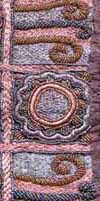6. SPIRIT OF SERVICE
My profession progressed
satisfactorily, but that was far from satisfying me. The question of further
simplifying my life and of doing some concrete act of service to my fellow-men
had been constantly agitating me, when a leper came to my door. I had not
the heart to dismiss him with a meal. So I offered him shelter, dressed
his wounds, and began to look after him. But I could not go on like that
indefinitely. I could not afford, I lacked the will, to keep him always
with me. So I sent him to the government hospital for indentured labourers.
But I was still ill at ease.
I longed for some humanitarian work of a permanent nature. Dr. Booth was
the head of the St. Aidan's Mission. He was a kind-hearted man and treated
his patients free. Thanks to Parsi Rustomji's charities, it was possible
to open a small charitable hospital under Dr. Booth's charge. I felt strongly
inclined to serve as a nurse in this hospital. The work of dispensing medicines
took from one to two hours daily, and I made up my mind to find that time
from my office-work, so as to be able to fill the place of a compounder
in the dispensary attached to the hospital. Most of my professional work
was chamber work, conveyancing, and arbitration. I of course used to have
a few cases in the magistrate's court, but most of them were of a non-controversial
character, and Mr. Khan, who had followed me to South Africa and was then
living with me, undertook to take them if I was absent. So I found time
to serve in the small hospital. This meant two hours every morning, including
the time taken in going to and from the hospital. This work brought me
some peace. It consisted in ascertaining the patient's complaints, laying
the facts before the doctor, and dispensing the prescriptions. It brought
me in close touch with suffering Indians, most of them indentured Tamil,
Telugu, or North India men.
The experience stood me in good
stead, when during the Boer War I offered my services for nursing the sick
and wounded soldiers.
The question of the rearing
of children had been ever before me. I had two sons born in South Africa,
and my service in the hospital was useful in solving the question of their
upbringing. My independent spirit was a constant source of trial. My wife
and I had decided to have the best medial aid at the time of her delivery,
but if the doctor and the nurse were to leave us in the lurch at the right
moment, what was I to do? Then the nurse had to be an Indian. And the difficulty
of getting a trained Indian nurse in South Africa can be easily imagined
from the similar difficulty in India. So I studied the things necessary
for safe labour. I read Dr. Tribhuvandas' book Ma-ne Shikhaman--'Advice
to a Mother'--and I nursed both my children according to the instructions
given in the book, tempered here and there by such experiences as I had
gained elsewhere. The services of a nurse were utilized--not for more than
two months each time--chiefly for helping my wife, and not for taking care
of the babies, which I did myself.
The birth of the last child
put me to the severest test. The travail came on suddenly. The doctor was
not immediately available, and some time was lost in fetching the midwife.
Even if she had been on the spot, she could not have helped delivery. I
had to see through the safe delivery of the baby. My careful study of the
subject in Dr. Tribhuvandas' work was of inestimable help. I was not nervous.
I am convinced that for the
proper upbringing of children, the parents ought to have a general knowledge
of the care and nursing of babies. At every step I have seen the advantages
of my careful study of the subject. My children would not have enjoyed
the general health that they do today, had I not studied the subject and
turned my knowledge to account. We labour under a sort of superstition
that the child has nothing to learn during the first five years of its
life. On the contrary, the fact is that the child never learns in after
life what it does in its first five years. The education of the child begins
with conception. The physical and mental states of the parents at the moment
of conception are reproduced in the baby. Then during the period of pregnancy
it continues to be affected by the mother's moods, desires, and temperament,
as also by her ways of life. After birth the child imitates the parents,
and for a considerable number of years entirely depends on them for its
growth.
The couple who realize these
things will never have sexual union for the fulfilment of their lust, but
only when they desire issue. I think it is the height of ignorance to believe
that the sexual act is an independent function necessary like sleeping
or eating. The world depends for its existence on the act of generation,
and as the world is the playground of God and a reflection of His glory,
the act of generation should be conrolled for the ordered growth of the
world. He who realizes this will control his lust at any cost, equip himself
with the knowledge necessary for the physical, mental, and spiritual well-being
of his progeny, and give the benefit of that knowledge to posterity.

